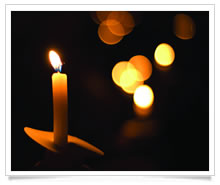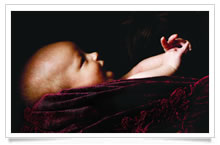The First Divine Service of Christmas
by Rev. William Weedon

Except for the occasional semi rumbling along the interstate, the night is remarkably quiet. The people are slowly gathering. This is a night we have longed for. For weeks now, Advent has been the focus: the certainty of our Lord’s glorious appearing, the strong warning of our Lord to watch and wait for that day, the uncompromising call of St. John the Baptist for repentance in our lives, crying out for our Emmanuel.
Advent has its own beautiful songs and themes, and we need Advent in our lives, but tonight, it has ended with the setting of the sun. That was hours ago. We are heading toward midnight, and instead of being in their beds asleep, little ones and old ones and everyone in between have come out into the cold and dark night to celebrate a Light that no coldness and no darkness will ever overcome. It is Christmas Eve, and the first Divine Service for the Nativity of our Lord is about to begin.
Why have Christians gathered for so many centuries at midnight for this celebration? The answer might surprise you. Tucked away in one of the Apocryphal books, The Wisdom of Solomon, we read:
For while all things were in quiet silence,
and that night was in the midst
of her swift course,
Thine Almighty Word leaped down from
heaven out of Thy royal throne,
as a fierce man of war into the
midst of a land of destruction.
The context is the angel of death coming to Egypt to destroy the firstborn, but the Church long ago heard something else in this passage: a description of the birth of our Lord, who is the Almighty Word, and who descended from the royal throne—Mary’s body, she being David’s offspring—in order to war against the enemies of God’s people: sin, death, and the devil.
Combined with St. Luke’s words about the shepherds keeping watch over their flocks by night, the notion became fixed that it was at midnight that the Virgin gave birth to the world’s Savior. The verse from Wisdom even serves as the antiphon for the Introit on this evening in the Lutheran Service Book, and the idea has remained fixed in popular piety by our hymns: “To show God’s love aright, / She bore to us a Savior, / When half-spent was the night” (LSB 359:2) and “It came upon a midnight clear” (LSB 366).
And so, century upon century after the birth of our Lord, Christians have kept vigil in the middle of the night, gathered together for prayer, praise, preaching, and receiving of Holy Communion to celebrate the birth in the flesh of the only-begotten Son of the Father.
All Glory Be to God on High
The great bell begins to sound, breaking the silence outside the church. Boom-boom, boom-boom. Written around the bow of the bell are the words, “Allein Gott in der Höh’ sei Ehr!” (“All glory be to God on high!”) These words were first heard on the very first Christmas Eve, floating down from the heavens to the earth. In all the centuries since, poor sinners have repeated those same words with joy, joining in the angels’ song. The church sings the greater Gloria often in the Divine Service, but it will ring with greater joy on this night, the night God first revealed it to man.
As the bell falls silent, the organ introduces Paul Gerhardt’s immortal “All My Heart Again Rejoices,” and the procession into the church begins. When we reach the Gloria in Excelsis,the joy is quite palpable. Weare singing together withthe angels this night,the night that theGood News was firstannounced as “goodnews of a great joy forall people.”
The collect is particularly poignant: “O God, You make this most holy night to shine with the brightness of the true Light. Grant that we who have known the mysteries of that Light on earth may also come to the fullness of His joy in heaven.” What light! A light in the darkness. A light no darkness can overcome. A light that was kindled this night in our very flesh when the Virgin gave birth to the Child who is Wonderful Counselor, Mighty God, Prince of Peace.
From Heaven Above
The reading of the Gospel is a true high point of this liturgy. The decree from Caesar Augustus, the journey from Nazareth to Bethlehem, and the remarkable brevity of the actual birth: “And she brought forth her firstborn Son and wrapped him in swaddling cloths and laid him in a manger.” Then we hear of the shepherds and the good news and the mystical song of the angels. When the Gospel is finished, the Nicene Creed trumpets forth, saying back to God what He has said to us.
Luther’s Christmas hymn “From Heaven Above” speaks to the child in all of us. It is so simply said, so majestically sung: “Ah, Lord, though You created all, / How weak You are, so poor and small, / That You should choose to lay Your head / Where lowly cattle lately fed. . . . Ah, dearest Jesus, holy Child, / Prepare a bed, soft, undefiled, / A quiet chamber set apart / For You to dwell within my heart” (LSB 358:9, 13). The sermon unpacks the unspeakable joys of this feast, when God appears in human flesh as our Brother to give to us all that is His.
After the Holy Communion is celebrated, as the people return from receiving into their dying flesh the undying body and blood of Him who is Mary’s Son with the promise of forgiveness and eternal life, the candles are lighted. From one to another the light passes until the whole church gleams with the shared light, which does not diminish no matter how many share it. Then together we sing the song of old Simeon who once held the Child, held the very body and blood of Him whom we have now received into ourselves. He is a light to lighten the Gentiles and the glory of God’s people, Israel. And so endless glory to the Father, Son, and Holy Ghost.
In the candlelight, the carol begins: “Stille Nacht, heilige Nacht.” “Silent night, holy night.” Indeed, in Christ, our Savior, we have seen and known the light of “love’s pure light” beaming from the face of the Redeemer, the very “dawn of redeeming grace” at the birth of our Lord. The singing isn’t loud or boisterous; rather, it is quiet and contemplative. We have seen, tasted, touched the love of God in human flesh and blood. A light that no darkness of our lives will ever be able to put out has been kindled within us by His body and blood. The eternal God has become our Brother, Friend, Savior, our hope.
Joy to the World

After the benediction, the candles are extinguished and the congregation erupts in “Joy to the world!” After the last hymn, the great bell rings again and keeps on ringing as we leave. Out into the darkness we may go, but we are witnesses to a Light stronger than the darkness, a Light that will never go out, a Light that is our Redeemer’s love in our human flesh and blood.
We go forth on Christmas already witnesses to Calvary and the Resurrection. The One who came among us in His flesh and blood came to offer it in perfect love to His Father on the cross and to be raised in that very flesh incorruptible and immortal, the source of our eternal salvation. He took humanity from us so He could die as the perfect sacrifice for human sin. This is the love that we have beheld at the midnight Divine Service for the Nativity. It is a love that makes the angels sing of glory on high and peace on earth, and we cannot help but join with them.
Midnight has passed. The occasional semi roars past on the highway. People begin to take leave of the church. Bethlehem proved not to be far away at all. It came near to us in the Divine Service and in the Savior. So as we leave, our hearts are filled and rejoicing. We have joined in worship and bowed down before the Lord who made us, the little Child born of Mary, praised by the angels, adored by the shepherds, later nailed to the tree, raised in incorruption, seated in glory, coming again at the joyous Last Day, and, in the meantime, given us as our very spiritual food in the Holy Supper.
Good news of great joy for all people indeed! It will be a short night. Christmas morning Divine Service is only hours away. We’ll gather again and receive even more. That is the way of our God: He gives us everything, and then He gives us more. Yes, glory to God in the highest and on earth peace, good will toward men! Amen.
—
About the Author: Rev. William Weedon is pastor of St. Paul Lutheran Church, Hamel, Ill.
December 2010





